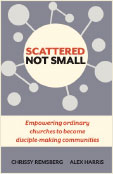
The benefits of microchurch for discipleship
The newest Firestarters book aims to empower churches to become disciple-making communities. It offers the idea that pursuing more scattered ways of being church might help in encouraging a body of believers to put into practice all they are learning. By Chrissy Remsberg
Discipleship is described with a variety of definitions. The writer Dallas Willard said, ‘Discipleship is the process of becoming who Jesus would be if he were you.’ At its heart discipleship is always rooted in becoming more like Jesus, so that we can do what Jesus did.
The newest Firestarters book is specifically aimed at the idea of trying to empower churches to become disciple-making communities. In one sense, most churches would say they are seeking to make disciples. However, we are trying to ask questions about what it means to make disciples and whether the way we are structured as churches is really designed for the kind of discipleship demonstrated in the Bible.
In Matthew 13 we see Jesus teaching the crowds, and in verse 10 there’s an aside recorded by Matthew between Jesus and his disciples where they ask questions about what he taught. In Matthew 14:13-21 the disciples are working alongside Jesus as he performs miracles and again teaches the people.
And in Matthew 10 and Luke 10 Jesus sends out first the 12 disciples and then 72 disciples to put into practice what they have seen and heard while living and working alongside Jesus.
These biblical examples give us a glimpse of the kind of discipleship Jesus intended. It’s a discipleship that includes both teaching and practice. At times this view of discipleship is described as an apprentice- type relationship that involves relationship, learning information, and practising what’s been learned.
I’m not saying much here that isn’t well known: the thornier question is how our modern expressions of the church facilitate this kind of discipleship.
In many respects, churches that provide space for community and healthy teaching of the Word are already well on their way to doing real, valuable discipleship. The larger a church grows, typically the more it will lean into small groups to provide those healthy relationships modelled in discipleship.
However, what seems to be lacking in our more conventional ways of gathering as a church is the element of putting into practice what we’re learning. I believe that conventional churches are good at creating the environment for disciples to be taught, but can sometimes struggle to create spaces for those same disciples to put into practice the learning of making more disciples. This is often a task left to the church as a whole, rather than to individual disciples.
 The question is how can we reframe the way we gather as a church to move from information to transformation? In the Firestarters book, Scattered Not Small: Empowering ordinary churches to become disciple-making communities, we offer the idea that pursuing more scattered ways of being church (ie, microchurches, missional communities, disciple-making movements) might be one way to allow our churches to take a shape more suited to the kind of discipleship that encompasses relationship, learning and doing. Throughout the book the question of ‘effective discipleship’ leads the way.
The question is how can we reframe the way we gather as a church to move from information to transformation? In the Firestarters book, Scattered Not Small: Empowering ordinary churches to become disciple-making communities, we offer the idea that pursuing more scattered ways of being church (ie, microchurches, missional communities, disciple-making movements) might be one way to allow our churches to take a shape more suited to the kind of discipleship that encompasses relationship, learning and doing. Throughout the book the question of ‘effective discipleship’ leads the way.
Small groups are great for relationships and Bible study but they rarely do mission. But small gatherings of Christians who gather around a missional identity will, by nature, develop tight knit relationships and in seeking to teach others about Jesus, will themselves learn and grow more in their own study of God’s word.
We believe this way of shifting our model of being church provides space to empower those we are discipling to begin to put into practice what they are learning about being and making disciples. This can be whether a church is a fully scattered model, or a hybrid that allows it to be both a conventional Sunday morning gathering alongside a variety of scattered microchurches. Like all churches, both conventional or scattered, a microchurch model can be more or less fragile depending on the structure around it. Thus a single microchurch on its own may be more fragile, similar to a very small conventional church without the membership to support it. However, hybrid or larger networks of microchurches gain in stability as their structures grow to support them.
There’s no magic bullet or ‘one size fits all’ solution to making disciples and growing healthy, Christ-like communities. We believe the church comes in many beautiful shapes and sizes and we want to celebrate them all. We also hope we might offer some simple questions and ideas to provoke all of us to consider whether the Holy Spirit might be springing up something new in our midst, or rediscover something old, that allows us to continue building up the body of believers and empowering more people to tell more people about Jesus.
The ideas in this article are explored in more depth in Firestarters’ second book, Scattered Not Small: Empowering ordinary churches to become disciple-making communities, and in season two of its podcast, which can be found on Spotify, Apple Podcasts or wherever you listen to podcasts.
Access the book and more at firestartersuk.com/resources
 |
Chrissy Remsberg leads Beacon Church in Stafford which is now ten microchurches networked as one church
Chrissy also co-leads the Firestarters Network with Alex Harris, a network passionate about helping churches grow |
Click here to
download a pdf version of this article